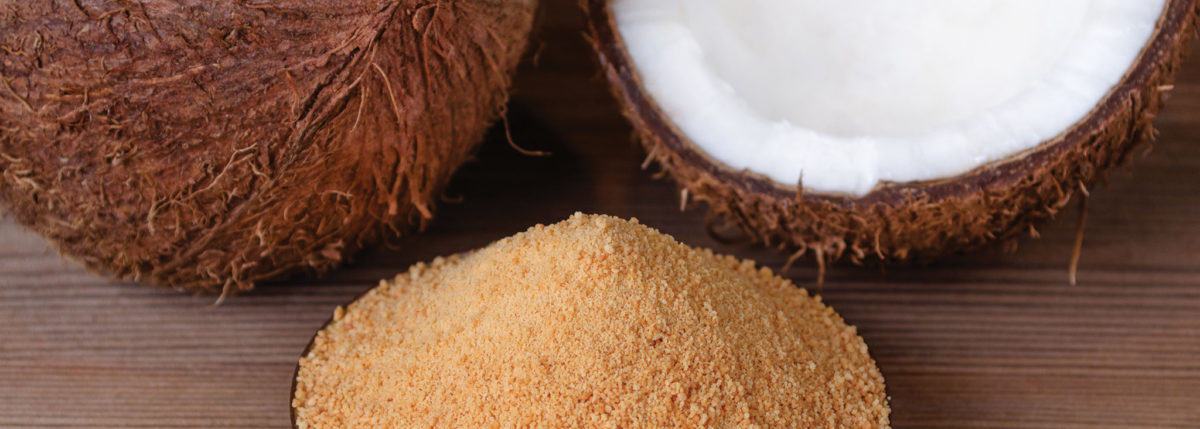Is Coconut Sugar Good for Type 2 Diabetes?
One of the advantages of the different forms and styles of eating is that more and more products are being developed which facilitate the preparation of some foods with a more pleasant taste. The problem is that sometimes it is difficult to really know what is behind these products, how they work and the effect they have on your body.
People who live with type 2 diabetes look for alternatives to satisfy that sweet tooth. One of those alternatives is the trendy coconut sugar. But, how much healthier is this type of sugar? Is it a good substitute for regular sugar and what impact does it have on blood glucose levels?
How coconut sugar is made
Coconut sugar is made through a simpler process than the one used for cane or beet sugar. However, it ultimately also contains fructose, glucose and sucrose.
The sap extracted from coconut palm flowers contains 80% water, 15% sugar and 5% minerals, which is why it transforms from a translucent liquid to a dense and dark brown substance when heated, until it crystallizes, making the coconut sugar we know.
Where coconut sugar comes from
In this case, it is a natural sweetener originating in the East. It is obtained from palms and date palms and has been widely used in Southeast Asia, especially in Thailand, Indonesia, Myanmar, Cambodia, the Philippines, or Vietnam, as a culinary ingredient, as well as a medicinal remedy. Currently, its domestic and traditional use has transcended to being commercial, since it is sold and exported from these countries to the West under the argument that it is healthier than table sugar and more suitable for those who live with diabetes and for those who seek a “natural” diet.
How coconut sugar affects blood sugar
Coconut sugar contains a similar level of fructose to cane sugar. So at least when it comes to the effects it has on our blood glucose levels, they are very similar.
Now, coconut sugar has a lower glycemic index than table sugar, which has a GI between 55 and 84. This is because it has a lower proportion of sucrose while the glycemic index in coconut sugar does not exceed 35.
Keeping in mind that the glycemic index is the speed with which a food raises blood glucose level, coconut sugar could be more suitable for people living with diabetes.
However, since it contains between 80% and 90% sucrose (the same as table sugar) in addition to 1 to 2% glucose and 2 to 4% free fructose, it is important to say that it will undoubtedly have an effect on blood glucose, perhaps not as high as table sugar but it may cause a significant elevation.
Other coconut sugar facts
Another piece of information to consider is this sweetener’s “quality” and calorie content. White or table sugar provides empty calories, in the sense that they have no nutritional value.
Coconut sugar contains small amounts of vitamin C, potassium, magnesium, calcium and other minerals. It contains a minimal amount which means that you would have to eat pounds of coconut sugar a day to benefit from these minerals.
Also, keep in mind that coconut sugar is not as sweet as white sugar, so many people tend to add more to get the sweetness they like and, in the end, we could end up consuming more coconut sugar than white sugar.
In short, coconut sugar is still sugar, and the amount of fructose and other sugars it contains, which is what counts when eating sugar, is similar to the rest.
Its only advantage may be that the process of obtaining it is simpler and more natural, so it is not as processed and artificial as table sugar.
Wondering if this alternative sweetener is right for you? Ask your team of diabetes care professionals, especially your nutritionist or diabetes educator, if you are interested in including this option in your diet.
References
Coconut sugar: Should you use it? (2013, December 15). Chicago Academy of Nutrition & Dietetics | CAND. https://eatrightchicago.org/coconut-sugar-should-you-use-it/
Jasmin Wrage, Stephanie Burmester, Jürgen Kuballa, Sascha Rohn, Coconut sugar (Cocos nucifera L.): Production process, chemical characterization and sensory properties, LWT, Volume 112, 2019, 108227, ISSN 0023-6438, https://doi.org/10.1016/j.lwt.2019.05.125. (http://www.sciencedirect.com/science/article/pii/S0023643819305560)





